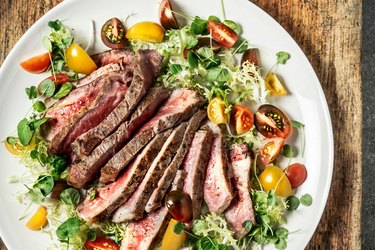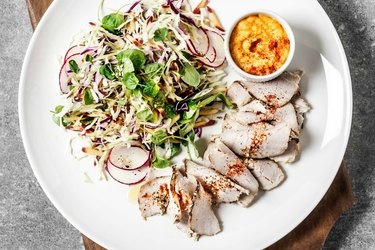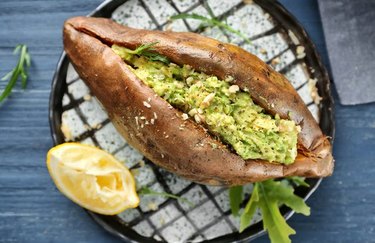
The Whole30 diet is a month-long eating program meant to help you reframe your relationship with food and identify which food groups work best with your body.
It was created by Melissa Hartwig Urban, Whole30 co-founder and CEO, in 2009. After eliminating certain foods for 30 days as an experiment, Urban saw dramatic improvements in her energy, sleep, mood and digestion, as well as her emotional relationship with food.
Video of the Day
Video of the Day
"It was the first time in my life I was able to get off the scale and out of the mirror," Urban tells LIVESTRONG.com. "The experiment brought about a profound and permanent shift in how I thought about food and my body."
After sharing her experience, several hundred people decided to follow along with the "rules" she drafted. "That was the start of the first-ever Whole30 group, in July 2009," Urban says.
While this diet has a lot of fans, it can be incredibly challenging and time-consuming. For that reason, in general experts often warn against overly restrictive diets. "Traditionally I don't recommend it due to the extreme restrictions," says Nijya Noble, RDN, founder of NK Fitness and Nutrition.
Learn more about this short-term, elimination diet program, including what you can eat (and what you can't).
What Is Whole30?
Unlike long-term approaches that focus more on weight loss (like keto or paleo diet), Whole30 is a 30-day dietary program that aims to help you better understand which foods work best for your body and wellness goals.
"Think of Whole30 like pushing the reset button with your health, habits and relationship with food," Urban says. According to Urban, eliminating the specified foods can affect these areas:
- Your cravings and emotional relationship with food
- Blood sugar regulation and hormonal balance
- Digestion and immune system
Samantha Cassetty, RD, a New York City-based nutrition and weight-loss expert, says she likes how Whole30 focuses on whole, real foods from quality sources. "Filling up on whole foods — notably, lots of veggies, as well as lean meats and healthful fats — over processed ones is a good way to nourish your body and mind," she says.
How Does It Work?
In addition to eliminating certain food groups for 30 days, Urban says during that time, you should make a point to notice your body's reactions.
"You'll pay attention to what happens to your cravings, energy, sleep, mood, attention span, digestion, aches and pains, anxiety, skin, allergies, asthma, migraines and other symptoms in the absence of these potentially problematic foods," she says.
At the end of the 30 days, you'll reintroduce those foods one at a time and compare that experience to how you felt while following Whole30. "You'll then take what you've learned about how these specific foods work for your body and brain and use that information to create the perfect, sustainable diet for you, because there is no one-size-fits-all," Urban says.
This is standard protocol for most elimination diets, per the Cleveland Clinic. It's also recommended that you work with a medical professional during reintroduction so they can monitor symptoms.
Other Whole30 Rules
In addition to avoiding certain food groups, the Whole30 program has a significant rule that should be followed for 30 days. Per the "Pancake Rule," re-creating prohibited foods with Whole30-compliant ingredients is off limits. That is, if you tend to nosh on french fries, avoid making your own using potatoes (even though that's a food that's allowed on Whole30).
Any baked goods or typically highly processed foods like pancakes, waffles, cookies or granola should not be purchased or recreated for compliance.
During the 30-day program you are also asked to avoid weighing yourself on a scale, refrain from having your body fat analyzed or take your body measurements.
Whole30-Friendly Foods

According to the Whole30 website, the program rules include eating:
- Moderate portions of meat, seafood and eggs
- Lots of vegetables
- Fruit
- Natural fats like those in fish or nuts
- Herbs, spices and seasonings
"Eat foods with very few ingredients, all pronounceable ingredients, or better yet, no ingredients listed at all because they're whole and unprocessed," per the Whole30 website.
Foods to Avoid
If you're wondering which foods to skip, first consider the Whole30 mantra: "When in doubt, leave it out. It's only 30 days." That mantra makes eliminating foods feel like a simple task. But since so many food groups are off-limits, you might find yourself needing to spend a lot of time reading labels and modifying recipes.
Whole30 foods to avoid include:
- Sugar (real and processed)
- Grains (wheat, rye, barley, oats, corn, rice, millet, bulgur, sorghum, sprouted grains, bran and germ)
- Gluten-free grains like quinoa, amaranth and buckwheat
- Legumes like beans, peas, lentils and peanuts
- All versions of soy, like tofu or soy sauce
- All dairy products
- Carrageenan
- MSG and sulfites
- Baked goods
- Highly processed foods
Proposed Benefits of Whole30
So, does Whole30 work? Well, that depends on your goals.
While you may lose weight (the average weight loss on Whole30 is between six and 15 pounds, Urban says), it isn't a weight-loss program specifically. And data on long-term weight loss from the data is lacking. Urban instead measures success with non-scale victories (NSVs).
"Diet culture has us so conditioned to use body weight as our primary measurement of health, but there are a million other factors that truly point to better health and quality of life in a way that doesn't make us neurotic or anxious," she says.
Urban says potential NSVs you may experience on Whole30 can include:
- Fewer cravings
- Higher energy levels
- Better sleep quality
- Improved mood
- Better focus and productivity
- Improved self-confidence
- Clearer skin
- Less swollen joints
- Increased mobility
- Less bloating
- Improvements in allergy symptoms
- Fewer migraines
- Less anxiety
- Lower blood pressure
These results have been found largely through testimonials from people who've tried the Whole30 diet. As mentioned, scientific data is lacking on the long-term effects the program may have.
Potential Risks of Whole30
When it comes to preparing for the obstacles of committing to Whole30, Urban says it all comes down to planning and preparation. "Whole30 is different from anything you've ever done, even if you're already eating healthfully," she says.
Here are some of the challenges and risks associated with this eating style:
- It's strict — there's not much room for flexibility in what you eat, Cassetty says, which may not be sustainable over longer periods of time.
- Food group restrictions can lead to nutrient deficiencies, per Houston Methodist Hospital.
- It requires lots of planning — you need to read the labels on all of your food, down to condiments, to make sure everything is Whole30-friendly.
- It may trigger disordered eating.
- It's not safe or recommended for people who are pregnant, older adults and people with frailty (like those recovering from major surgery), per the Ohio State University Wexner Medical Center.
Tip
Talk to a doctor or dietitian before attempting Whole30 or any other restrictive diet to make sure it's safe for you, especially if you have an underlying medical condition.
Who Should Try the Whole30 Diet?
Though the Whole30 diet is not a long-term program to follow, Noble says it can be a good option for someone who wants to challenge themselves. "If someone is looking for a 30-day health and wellness challenge or something short term, then you can learn a lot," Noble says.
The process of eliminating and re-introducing foods can also benefit someone trying to determine food intolerances. "Whole30 is good for someone who wants to learn more about things that bother them, but I suggest you try to do this with a professional, like a registered dietitian," Noble says.
But, she adds, because of the extreme dietary restrictions, it is a potentially risky program for anyone with a history of disordered eating. And, it's not recommended for those looking for a quick path to weight loss. "This is very restrictive, so if it doesn't work out don't freak out about it. I see a lot of people who mess up and feel heartbroken, and are hard on themselves. Allow yourself flexibility," Noble says.
Tip
If you suspect you may have a food intolerance or allergy, work with a dietitian to help identify what food is causing discomfort.
Sample Whole30 Meal Plan

Wondering how to start the Whole30 diet? Try these recipes to kick off the first days of your program.
Day 1
- Breakfast: Baked Eggs in Pepper Cups
- Lunch: Paleo Charred Lemon Skirt Steak Salad
- Dinner: Instant Pot Spaghetti Squash with Spicy Chicken Sausage and Mustard Greens
Day 2
- Breakfast: Stuffed Avocado
- Lunch: Modern Nicoise Mason Jar Salad
- Dinner: Protein Turkey Burger
Day 3
- Breakfast: California Scrambled Eggs and Avocado
- Lunch: Sweet Potato Salad
- Dinner: Paleo Chimichurri Chicken
Day 4
- Breakfast: Tuna Cucumber Boat
- Lunch: Green Eggs and Kale Salad
- Dinner: Grilled Vegetable "Burgers"
Day 5
- Breakfast: Baked Sweet Potato With Guacamole
- Lunch: Paleo Cinco de Mayo Steak Salad
- Dinner: Pan-Roasted Broccoli with Tahini Dressing
Day 6
- Breakfast: Protein Breakfast Scramble
- Lunch: Spicy Avocado and Anchovy Salad
- Dinner: Paleo Roasted Spaghetti Squash
Day 7
- Breakfast: Acorn Squash Hash
- Lunch: Arugula Salad with Salmon and Avocado
- Dinner: Paleo Creamy Chicken Chili Verde
The Best Whole30 Snacks
Snacking isn't encouraged on the diet, because recognizing if you are really hungry or just bored is part of the Whole30 process.
But the program does recognize that it's sometimes necessary to eat between meals, per the Whole30 website. If you find yourself needing a snack, aim to eat a food or mini meal that contains protein, fat and carbs, such as:
- A hard-boiled egg
- Carrots dipped in Primal Kitchen Ranch dressing ($7.49, Amazon.com)
- A small portion of Whole30 leftovers from last night's dinner
- An egg and veggie muffin
- Tuna mixed with homemade mayo and a pickle
- A hot dog and an orange
- Jerky with a handful of chopped veggies and a handful of cashews
Bottom Line
Whole30 is a 30-day elimination diet that focuses on eating whole foods including meat, fruit, vegetables, nuts and seeds. Foods that are prohibited during the 30 days include grains, dairy, sugar, baked goods, legumes, alcohol and processed foods.
Following this program can have potential benefits like improved energy and digestive health. While some people may find this short-term reset helpful and illuminating, others may find the program overly restrictive. It can be particularly problematic for people with a history of disordered eating.
Whole30 is not intended to be long-term weight loss solution and should end after 30 days given the restrictive nature of the diet.
- International Food Information Council Foundation: "2018 Food & Health Survey"
- Whole30.com: "Meet the Whole30 Team"
- Ohio State University Wexner Medical Center: "Whole30-style diets: The good, the bad and the healthy"
- Whole30.com: "Whole30 101: Snacks on the Whole30"
- Cleveland Clinic: "Why and How To Start an Elimination Diet"
- Houston Methodist: "Keto, Whole30, Intermittent Fasting & Everything In-Between: The Pros & Cons of Popular Diets"